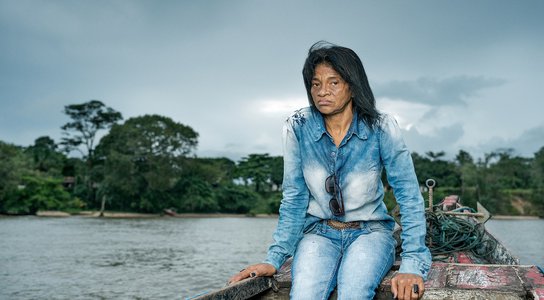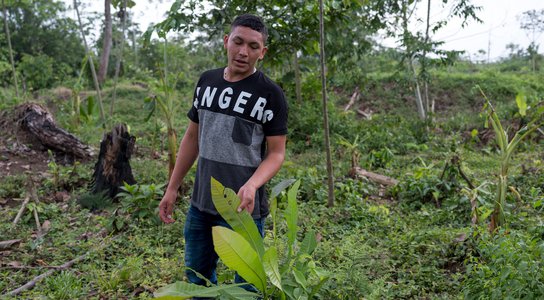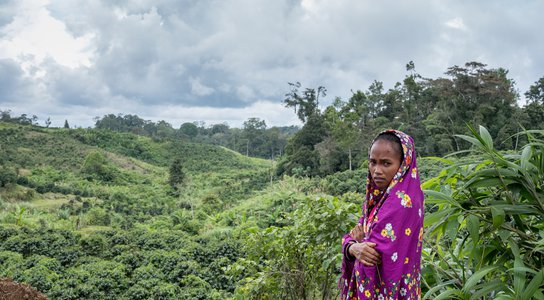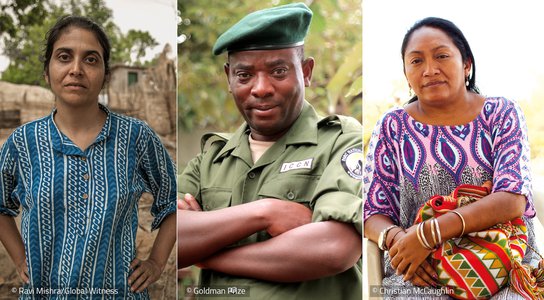Voluntary guidelines for
agribusiness, and their relevance
to defenders
A range of voluntary guidelines for agribusiness exist which, if properly interpreted and implemented, would ensure that companies and investors not only avoid harming defenders, but support and protect them, facilitating community participation in decision-making. Many of their principles could also be interpreted by other businesses in the natural resource sector.
Of particularly practical utility is the guidance
produced by the Interlaken Group on how companies
should implement the Voluntary Guidelines on the Responsible Governance of Tenure of Land, Forests and Fisheries and Forestry in the Context of National Food Security (VGGT), which were themselves the
result of extensive consultation with governmental,
private sector and civil society representatives, and are
endorsed by 193 governments.
The Interlaken Group guidance, entitled ‘Respecting Land and Forest Rights' (the Interlaken Guidance),
is unique in being the only authoritative agribusiness
guidance actually written by representatives from
the private sector, together with civil society and
governments.299 It lays out what companies need to do
to comply with the VGGT, what indicators of compliance
might look like, and which resources exist to support
efforts towards compliance. The guidance covers a range
of project types: greenfield investments, brownfield
investments, existing holdings, joint ventures or mergers
and acquisitions, plus procurement and supply chains
Many of the Interlaken Guidance’s key principles could
help prevent threats against land and environmental
defenders, and include:
- Guaranteeing proper consultation and
participation of affected communities, and the
right to free, prior informed consent (FPIC): The lack
of community consultation and consent for business
projects is one of the root causes of conflict that leads
to threats and attacks against defenders.
The Interlaken Guidance encourages companies to resource robust consultation processes and secure FPIC from indigenous peoples before making investment decisions, and to also meaningfully consult all neighbouring and host communities before changes are made to a project. - Ensuring transparency in all areas of business,
and a zero tolerance policy on corruption:
Communities and activists can only be effective in
defending their rights and engaging with business if they
have the information necessary to do so. On the other
hand, corruption fuels attacks on defenders by facilitating the imposition of projects and fostering impunity when threats occur.
The Interlaken Guidance demands companies ensure transparency across all interactions with officials and communities, and avoid business with ‘politically exposed persons’. Project details should be available to communities in local languages. Environmental, social, human rights and food security analyses should be participatory, published and conducted before investment decisions are made.
- Ensuring proper due diligence along supply chains:
Investors and companies have a duty to ensure that
their procurement policies are not negatively affecting
defenders, and that the highest human rights standards
are upheld along supply chains.
The Interlaken Guidance reminds companies that compliance with the VGGT requires engaging and encouraging suppliers on the same issues they ought to be tackling themselves. Companies should ensure full traceability, codify their expectations on suppliers, audit compliance and potentially change supplier if standards are not met. - Ensuring that the VGGT are properly implemented
at every moment of the project cycle: Business should
take steps to consult communities and guarantee the
rights of defenders before taking investment decisions,
and throughout any project’s evolution.
The Interlaken Guidance is clear that, if a company takes over an existing project – whether through joint ventures or mergers and acquisitions – it ought to review existing environmental and social impact assessments, human rights impacts assessments, and any contracts they have in place, consulting affected communities and ensuring the VGGT are properly applied. - Ensuring proper grievance mechanisms and access to remedy: When defenders face threats, it is imperative
they can alert businesses quickly and securely. Business
has a responsibility to remedy any violations that have
occurred, and accountability will reduce the possibility
of threats escalating or re-occurring. Likewise, if effective
grievance, accountability and remedy mechanisms
are implemented for complaints regarding land tenure
or FPIC, it is less likely that grievances will escalate to
conflicts and, ultimately, attacks on defenders.
The Interlaken Guidance is clear that companies should back out of investments or operations if they could lead to forced evictions, and that projects should be abandoned if forcibly evicted communities wish to return to the area. Similar consequences could therefore be expected if projects lead to threats or attacks on defenders.
Two other voluntary guidelines reiterate a number of
these points and should guide agribusiness in preventing
threats against defenders: the OECD Guidelines for Multinational Enterprises and the OECD–FAO Guidance for Responsible Agricultural Supply Chains, which translates companies’ human rights due
diligence responsibilities into practical steps.303 It sets
out situations that represent ‘red flags’ and warrant
enhanced due diligence. Threats against defenders and
restrictions on civil society should be included as red flags
when assessing areas, products and business partners.
Finally: evidence proves that guidance alone is not
enough. Companies and investors must develop concrete
policies to guarantee their implementation, and states
must legislate and prosecute to guarantee accountability
when agribusiness violates human rights.
Free, Prior and Informed Consent:
International law, guidance and practise protect
the principle that all communities should be able to
make free and informed choices about whether and
how their land and natural resources are used and
developed, with individuals having the right to say
‘no’ to business projects which affect their rights,
their land or their environment.
International experts have developed a number of
tools exploring what proper free, prior and informed
consent (FPIC) should look like in practice, but key
principles include:
- FREE – nobody should be coerced, intimidated, or manipulated into giving their approval to a project. Where defenders are under threat, therefore, conditions for FPIC do not exist.
- PRIOR – sufficient time should be given for
decision-making before bidding for licences and
land takes place, and before each significant study,
change or phase in a project.
- INFORMED – communities must have all
the information they need. The information must
be objective, accurate, and accessible in their
native language.
- CONSENT – the right to veto a project should
be guaranteed. Consultation is not consent.
Under international law, the right to give or withhold
FPIC is best understood as an expression of the right to
self-determination. It can be interpreted as applying to
all self-identified peoples who maintain customary (ie.
administered under traditional systems and customs)
relationships with their land and natural resources,
particularly indigenous peoples. This is enshrined in
International Labour Organization Convention 169 on
Indigenous and Tribal Peoples plus the UN Declaration on
the Rights of Indigenous Peoples, and reiterated
by a range of expert guidance.
These specific, additional protections afforded to
indigenous peoples under international law are clear
and states have a duty to replicate and implement them
at the national level. However, there is an increasing
recognition that the principle of FPIC should be applied to
all communities whose land, resources or rights might be
affected by a business project.The right of every citizen to
participate in public affairs has long been outlined in the
International Covenant on Civil and Political Rights,whilst
the UN Declaration on the Right to Development is clear
that all individuals should be able to participate freely
and meaningfully in development and its benefits.
The UN-REDD Programme, aimed at preserving forests to reduce carbon emissions, states that FPIC is a means to ensure “the full and effective participation of relevant stakeholders [including…] local communities”.Regional conventions have reiterated the need to guarantee public participation, and the UN Special Rapporteur for the right to food has asserted that “any shifts in land use can only take place with the free, prior, and informed consent of the local communities concerned.”The palm oil sustainability watchdog RSPO agrees that FPIC is a requirement for all potentially affected communities; a principle reinforced by Michelin Tyres,the Colombian Constitutional Court,and government agencies of Indonesia,amongst others.
As well as governments, business also has the responsibility to ensure that FPIC is guaranteed before projects go ahead. The UN Guiding Principles on Business and Human Rights not only underscore the business duty to respect international human rights law, regardless of the capacity or will of the state to enforce it, but also reiterate the importance of meaningful consultations with potentially affected groups.IFC Performance Standard 7 too articulates expectations upon investors in regards to the necessary consent of communities with customary relationships with their land.
What exactly can business
do for defenders?
In 2015, a cross-regional group of 39 human rights organisations used the occasion of the UN Forum on Business and Human Rights to outline, as follows, how business might play a proactive positive role to engage and support human rights defenders(HRDs).
Business must respect and engage with HRDs,
such as by:
- Desisting from physical or legal attacks against HRDs,
including those exercising their rights to freedom of
expression, association, peaceful assembly and protest
against the business or its interests;
- Meaningfully consulting with HRDs in the design,
implementation and evaluation of projects, and in due
diligence and human rights impact assessment processes;
- Advising and educating clients, suppliers and peers
as to their obligations in relation to HRDs.
Business should support and partner with HRDs,
such as by:
- Encouraging home and host governments to consult
with HRDs in the elaboration of national action plans on
business an human rights (NAPs) and to include concrete
measures and commitments to support HRDs in such
NAPs; addressed alleged murders of, attacks on, and
acts of intimidation against HRDs who campaign against
the adverse impacts of extractive company operations
and allegations regarding the impact of mining and
hydroelectric projects on indigenous peoples.
- Encouraging home governments to speak out in
support of HRDs through their diplomatic representations
in States in which the company operates and HRDs
are restricted.
Business can advocate and seek remedy for HRDs at risk, and against laws and policies that restrict them, such as by:
- Joining or supporting, in an appropriate way, a
campaign or coalition in support of HRDs and against
attacks and restrictions against them;
- Speaking out in general terms in support of HRDs
and a safe and enabling environment for civil society;
- Speaking out in individual cases of attacks or
restrictions against HRDs or in relation to proposed or
enacted laws or policies that restrict or criminalise them;
- Advocating to governments in relation to individual
cases, laws or policies.
Business should make additional efforts and take specific action to engage and protect women human rights defenders and other groups facing particular risks:
- Recognising and addressing the fact that women
human rights defenders can face increased exclusion
and specific risks;
- Taking additional positive actions to consult and
protect women human rights defenders, indigenous
defenders and minority groups;
- Ensuring that a response to the particular situations
of women human rights defenders, indigenous defenders
and minority groups is included across all business action
related to human rights defenders.
Contacts
-
At What Cost?
Irresponsible business and the murder of land and environmental defenders in 2017
You might also like
-
Campaign Hub 2017 Defenders Annual Report
'At What Cost?' looks at irresponsible business and the murder of land and environmental defenders in 2017.
-
Blog post At What Cost? Two weeks on
What makes our Defenders Annual Report – and what happens after?
-
Report Defenders of the earth
2016 saw a record 200 killings of people defending their land, forests and rivers against destructive industries